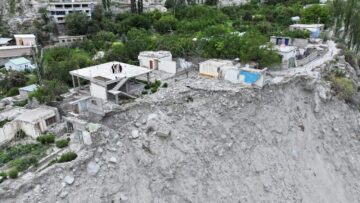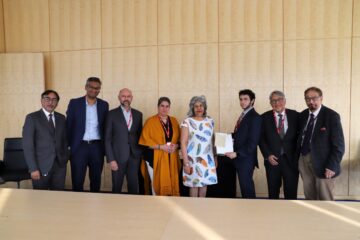The Institute of Ismaili Studies organised a series of events to commemorate the 1,000th birth anniversary of the poet, philosopher and traveller, Nasir Khusraw, in early September 2003. In addition to hosting a three-day international conference on Nasir Khusraw in Khorog, Tajikistan, the Institute also collaborated in the production of a play and concert, the hosting of an awards ceremony and the release of several publications in Tajik-Cyrillic.
One of the foremost poets of the Persian language and a major contributor to Ismaili thought, Nasir Khusraw has attracted passionate attention for nearly a thousand years from admirers and critics alike. Celebrated for a poetry that combines art with philosophy, and revered and criticised for his theological texts, Nasir Khusraw remains one of the most fascinating figures in Islamic history and literature. A personal record of his seven-year journey from Central Asia to the Mediterranean coast, Egypt, Arabia and back again, has been studied for its detailed descriptions of cities, societies and customs. However, his success as a spokesperson for the Fatimid Ismaili tradition caused public and official opinion to turn sharply against him, forcing him to flee for his life. He spent the last fifteen years or so of his life in exile under the protection of a local prince, in a remote place tucked away in the mountains of Badakhshan, north of the Hindu Kush.
As part of the celebrations to commemorate his birth anniversary, The Institute of Ismaili Studies organised a series of events promoting intellectual and artistic dialogue on the eleventh century figure. The largest of these was a three-day international conference organised in collaboration with the Government of the Republic of Tajikistan, the Aga Khan Development Network and Khorog State University entitled, Nasir Khusraw: Yesterday, Today and Tomorrow’. The event, the largest academic conference held in post-Soviet Badakhshan, attracted 75 international presenters and drew an audience of more than 400.
The academic meetings, held from September 2 – 4, 2003, focused on three main themes: (a) the significance of Nasir Khusraw’s life, thought and work; (b) the tradition of belief, folklore, oral or written poetry, music and ritual attributed to Nasir Khusraw as he is represented in the living traditions of Persian-speaking communities; and (c) the socio-political, cultural, religious and ethical issues arising from the contact of these traditions with the forces of modernity in the contemporary world.
The Institute also released the publication of three works in Tajik-Cyrillic: Nozir Arabzoda’s The World of Ideas and Reflections of Nasir Khusraw; a transliteration from Persian of the third volume of a series of Nasir Khusraw’s philosophical essays; and a transliteration of Alice Hunsberger’s Nasir Khusraw, The Ruby of Badakshan.
In addition to the above publications, the Institute was also involved in the production of a concert showcasing the artistic and cultural expressions of Badakhshani life, a play produced by the Khorog State Theatre and an award ceremony recognising the winners of an artistic and academic competition amongst Badakhshani secondary school students, commemorating the larger vision and ethics of Nasir Khusraw.
IIS-sponsored scholars, representing 13 countries also made presentations at the internationa lNasir Khusraw symposium in Dushanbe and were actively involved in other national Government sponsored events. These included the unveiling of two white marble statutes of Nasir Khusraw at Porshinev and Qobadiyan and the opening of a Nasir Khusraw museum at the Chasmae Nasir Khusraw. Responding to the request of the Governor of Badakhshan, His Excellency Alimamad Niyozmamadov, the IIS presented more than 60 of its publications to the newly-opened museum.
Opening of the Nasir Khusraw Conference






